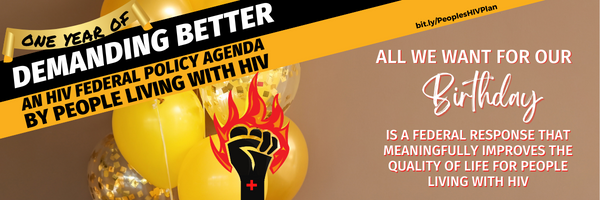Last year, networks of people living with HIV in the United States came together as the U.S. People Living with HIV Caucus (HIV Caucus) to outline our policy agenda for the federal response to the HIV epidemic. Today, on the year anniversary of Demanding Better: An HIV Federal Policy Agenda by People Living with HIV, we have a birthday wish:
People living with HIV networks are organized formations created, led by, and accountable to the estimated 1.2 million people living with HIV in the United States. They are vehicles through which we, as people living with HIV, can define our own agenda, choose our own leaders, and speak with collective voices. The US PLHIV Caucus emerged in 2010 as a “network of networks” in response to the need for a national voice that represents communities most impacted by the epidemic in the United States. If you are a person living with HIV, the HIV Caucus is here for YOU. Read more to find out what we have accomplished, what needs to be done, and how you can get more involved.
In the Demanding Better agenda, we provided concrete recommendations to ensure a rights-based federal HIV response that commits to dignity, safety, and holistic wellness for all people living with HIV, and which centers racial, gender, and economic justice.
So one year after Demanding Better came out, what has changed?
In response to our demands for meaningful engagement with people living with HIV:
- The National Institutes of Health’s Office of AIDS Research issued new community engagement guidance.
- The HIV Caucus was named as a key partner for supporting “community-driven solutions” in a federal funding announcement for the National Institutes of Health.
We won an indicator on quality of life of people living with HIV.
The 2022-2025 National HIV/AIDS Strategy (NHAS) committed, for the first time ever, to create standards to assess the quality of life of people living with HIV outside of biomedical indicators of viral suppression. The HIV Caucus participated in a federal interagency workgroup meeting to inform the development of those standards. We left that meeting clear that there’s a lot of work ahead to ensure a well-rounded understanding of quality of life for people living with HIV. And, importantly, the2022-2025 NHAS also aligned with our Demanding Better recommendations by explicitly focusing on advancing racial equity and naming important gaps in addressing the needs of sex workers and immigrants.
We have continued to move the needle on concerns about HIV data privacy and invasive surveillance practices that place our communities at harm.
The HIV Caucus is working with the Presidential Advisory Council on HIV/AIDS (PACHA) to develop concrete recommendations that will address community concerns about harmful practices such as molecular HIV surveillance. We have also worked with researchers. In face,a group of researchers paused their research, which relied on MHS, in light of concerns that we raised. They then wrote an article about their decision and the ethical uses of molecular HIV data. See Lessons Learned from Community Engagement Regarding Phylodynamic Research with Molecular HIV Surveillance Data by Diana M. Tordoff; Brian Minalga; Alfredo Trejo; Alic Shook; Roxanne P. Kerani; Joshua T. Herbeck.
We have elevated HIV criminalization as a crisis facing our communities, and as a barrier to achieving public health goals. White House Office of National AIDS Policy Director (ONAP) Harold Phillip has declared that modernizing or repealing HIV criminalization laws is a top priority and President Biden agrees! On World AIDS Day 2021, President Biden decried HIV criminalization laws as subverting the goals of ending the HIV epidemic in the U.S.
We have elevated concerns about the status neutral approach moving out of clinical settings into broader HIV programing. This includes concerns about the impact the status neutral approach could have on support for people living with HIV and its inclusion in funding opportunities without clear guidance.
We are not done! There is more to do in the fight for the full human rights, health and dignity of people living with HIV. We are ramping up the pressure on the government to end MHS and pass the REPEAL HIV Discrimination Act. We recently launched the Ready, Set, REPEAL Campaign to push Congress to pass the REPEAL HIV Discrimination Act!HIV criminalization laws are discriminatory, stigmatizing, and outdated. They undermine public health by discouraging HIV testing, fueling racist & harmful myths about HIV transmission, and further marginalizing communities already most policed, surveilled, and harmed by the criminal legal system. Did you know there’s more the U.S. Congress could be doing? Join us for a campaign orientation webinar, where we’ll be breaking down what you can do to fight to pass the REPEAL Act.


